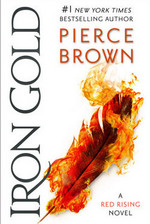 Iron Gold
Iron Gold
by Pierce Brown
Series: Red Rising, #4
Hardcover, 600 pg.
Del Rey Books, 2018
Read: February 5 – 13, 2018

. . . We didn’t prepare for this.”
“How do you prepare for a kick in the balls?” I say. “You don’t. You suck it up.”
“That supposed to inspire me?. . .
Darrow’s words about the mission he and the Howlers are ill-prepared for also apply to readers of Pierce Brown books. At some point, you have to suck it up and keep moving. I typically considered Brown’s writing to be full of gut-punches, but Darrow’s anatomical metaphor applies, too. Yeah, we love the books, and Brown makes sure the experience is almost as harrowing for the readers as it is for the characters.
After President Snow dies, after Tris finishes with the Factions, after The Matrix reboots, after The Emperor Dies and the teddy bears sing, “Yub nub, eee chop yub nub,” what happens? (well, thanks to J. J. Abrams, we have an idea about that last one) Iron Gold lets us see what happens 10 years after the events of Morning Star.
The Republic is still at war, trying to finish off the remnants of the old order — the Senate isn’t rubber stamping Darrow’s requests and that is proving problematic. The people are tired of the bloodshed and want the focus to move to strengthening the fledgling government. Driving Darrow to a last-ditch and dramatic gesture. The lives of the Reds on Mars is technically better, they’re technically free, but things aren’t much better — in fact, they may be less safe. Criminals on Lune are doing well, but those who served during the War are still trying to deal with the trauma they survived. Meanwhile, on the far end of the solar system, some exiles from Lune are looking to regain some prominence. Brown jumps around from story to story, between various perspectives, surveying the wreckage of the Society and the birth of the Republic.
Each character is as well-drawn, and fully developed, as sympathetic as those who came before in the series — even those who are critical of Darrow/the Republic (if not downright opposed to it). This is a more complicated world than the one we last saw. I’m going to keep things pretty vague and not go further than this, because half of the joy of this book is in the exploration.
Jumping from perspective to perspective, between storylines that have almost nothing to do with each other make for a lesser novel than the previous books in the series. When I was following a character — their story was gripping, I was interested and invested — but the instant the perspective shifted? It was all about the new story/perspective and I pretty much forgot about the previous. Darrow’s story was the exception, but I attribute that to my long-standing connection to Darrow, Sevro and the rest. I loved the conclusion of Darrow’s story — because of what it means for Darrow and the rest, and what it means for the next book in the series (saga?).
I’m glad we got this look at the aftermath of the Rising — if we were going to get anything at all — it seems right for things to be this way. I wasn’t as invested in this novel as I was in the previous ones, but I’m just as invested in this world. I hope the next one will grab me better, but until then I wait on tenterhooks and with hope that Darrow and the rest will deliver the goods. This is not the place to jump on the series — go back toe Red Rising and start from the beginning, it’s worth it. For those who’ve been with man from his harrowing beginning through his even more harrowing and devastating triumphs, this is a must read.
—–




Read Irresponsibly, but please Comment Responsibly